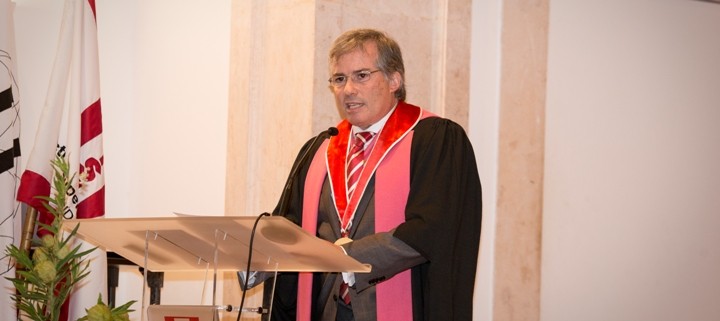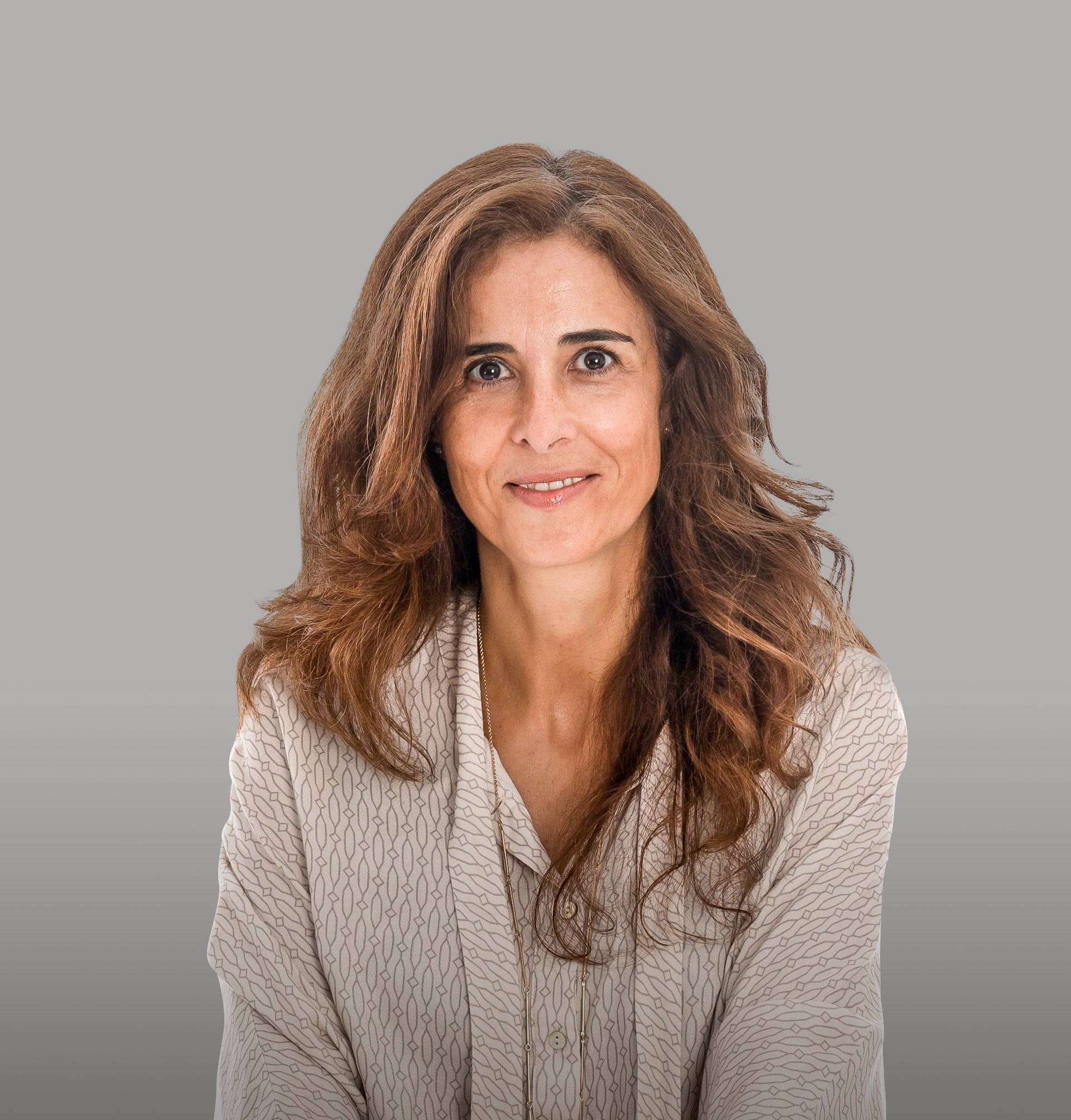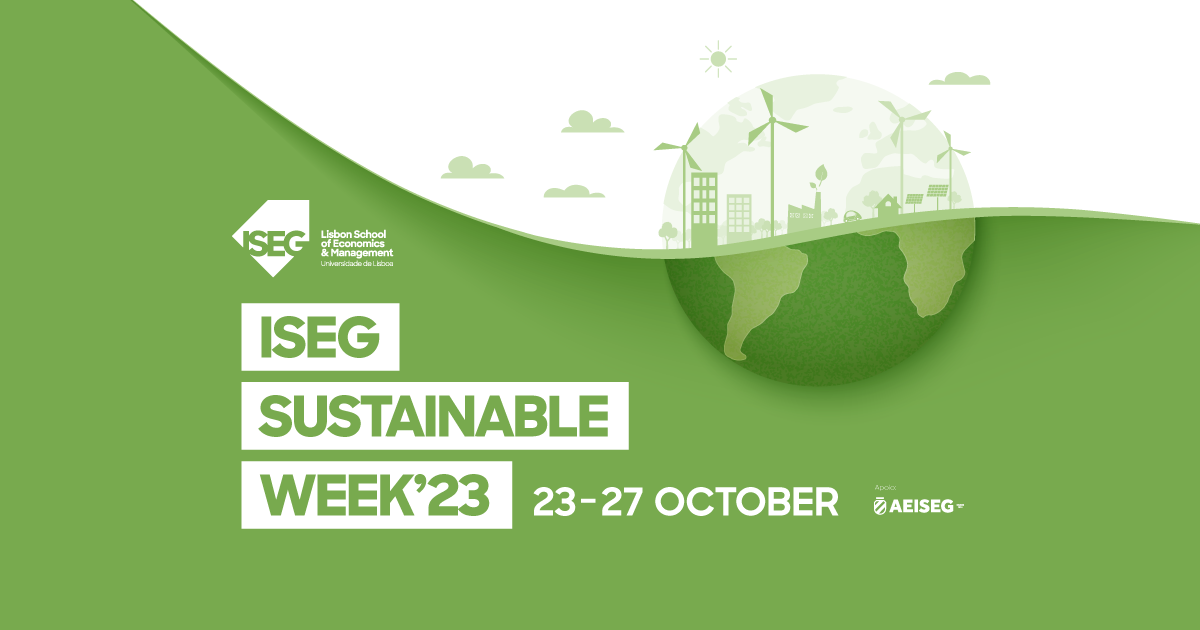
Magnificent Rector,
Mr. President of the School Board,
Mr. Vice-President of the Students' Association,
Distinguished Guests,
Dear Colleagues, teaching and non-teaching staff,
Dear Students,
Ladies and gentlemen,
ISEG is a centenary institution to which we are all proud to belong. It is the oldest school of economics and management in the country and is part of the most recognized Portuguese university - the University of Lisbon.
Many of the most brilliant Portuguese economists and managers have been trained and taught at this Institute. ISEG is a pluralistic school, with a tradition of defending academic independence and free economic and political thought.
ISEG is an undisputed reference for the oldest generations of Portuguese economists and managers, as was evident in the celebration of its hundred and third anniversary. Its tradition and historical role in Portuguese society are indisputable.
However, economic globalization is also an unavoidable reality, with its thorns, challenges and opportunities. Despite some initial optimistic expectations, the country quickly realized that it was plunged into a new, and much more difficult, context. Some Portuguese companies, once healthy and emblematic, faded away, sometimes as a result of some opportunism and management errors, but also of the inability to adapt to a shrinking, more demanding and competitive national market. The solution for many companies was, and still is, export and internationalization.
It should be borne in mind that the globalization of the economy affects every sector of activity, including education and, in particular, higher education. In order to cope with these structural changes, it is essential to try to anticipate the future and give a new dynamic to educational institutions. It is necessary to redefine objectives, improve processes, introduce new technologies, adjust the image, and have vision. Vision to understand and predict the natural dynamics of a global market. But all this, we learn and teach at this School.
ISEG, which was for many years "The School" of Economics and Management in Portugal, has shown some difficulty in understanding and adapting to the new global academic context.
We are an excellent school of economics, management, applied mathematics and social sciences, with good facilities, pedagogically competent teachers (as demonstrated by the periodic pedagogical surveys), a leading school in Portugal in scientific production in economics and management. It is a source of pride for all of us that all ISEG research centers have passed to the 2nd phase in the FCT evaluation process.
However, despite the School's significant scientific and pedagogical capacity, it is not a leader in Portugal in terms of attractiveness and is clearly not a reference in the international academic context.
Over the years, we have watched too passively the proliferation of academic networks, strategic alliances between higher education institutions, partnerships to offer joint courses, double degrees, international certifications and accreditations. It is worth noting that many of the international benchmark accreditations are not aimed at good schools, they are aimed at good schools ... internationally!
These accreditations influence the rankings of courses and educational institutions, which are used as advertising tools, and naturally condition students' preferences. This is the world we live in, and we have to adapt to it if we want to maintain the prestige of yesteryear.
I want to take this opportunity to highlight that I was very pleased to receive the news that ISEG has formally moved on to the 2nd phase of the AACSB accreditation process, the most recognized international accreditation of business schools. I would also like to thank all those involved in the process, and there were many, for the excellent work done.
In Portugal, the number of foreign students has increased in recent years, mainly due to the success of the Erasmus program, but since 2014, Portuguese legislation has also allowed universities to directly admit foreign students to their degrees.
The best national schools seek to position themselves on the world market by creating the conditions to attract good students and teachers, regardless of their nationality, in order to increase and expand their reputation, while also broadening the job market opportunities for their graduates.
Good students applying for higher education are increasingly interested in performance and employability indicators and the labor market currently goes far beyond the borders of Portugal, which unfortunately does not have the capacity to retain its most qualified resources. The employability of our students is a key objective for us and we will install a career management office later this month.
We have to be aware that the national championship of higher education institutions tends to end! The good schools will be international, concerned with the recognition of their quality, through international certifications, their research, teaching, assessment and employability processes. Other schools, essentially "regional" in scope, will coexist, focused primarily on the transmission of knowledge, without aspirations of international projection.
Information and communication technologies, which have already had a very significant impact on research (through rapid access to articles, networking and collaborative work), will also change the teaching process, especially in the primary school, which has hardly changed in the last 50 years. The slate board has been replaced by the projector, but little else has changed.
The potential of existing information and communication technologies is far greater than their current use in higher education. I envision the future classroom to be fundamentally virtual, interactive, using multimedia content, much of which will be freely available on the internet (indeed, it already is). The interfaces will be extraordinarily user-friendly, the digital format, in text but also in video, will prevail. Paper will be found only in some, less noble, spaces of the buildings.
ISEG has to adapt to this new reality, with more intensive use of technologies in the teaching process and look at the opportunities of the global market. Our borders should also not be delimited between Lapa and Madragoa. It is essential to have ambition and look beyond the horizon of the Estoril line.
ISEG's history allows no other alternative. ISEG must establish itself as a school of international prestige, because only then can it improve its reputation in Portugal.
Internationalization will imply quality courses in English but also in Portuguese. We should not forget the important role that Portugal, and ISEG in particular, should assume in the collaboration with Portuguese-speaking countries. It is important that ISEG maintains its identity and teaching in Portuguese. Most of ISEG's courses will, of course, be in Portuguese.
This is not an easy project, nor an immediate one, but it will be progressively accomplished. In my reengineering classes, I am careful to explain to students that any reengineering project, i.e. radical change of organizational processes, is a high-risk project, and is not a solution for all cases. This will not be a reengineering project, but it will be a successful one.
We are building two new auditoriums and a classroom, which should be completed in October 2015, and we will start next summer the construction of the new building to support the research and entrepreneurship centers, which should be completed in 2016. We are also aiming for a student residence and greater involvement in the Lapa Sports Complex, which has already been in use since last month by our students.
This year, we offered 50 more scholarships for new undergraduate students. We will very soon readjust and improve administrative processes and also seek to implement motivation mechanisms, in a context that is not easy, as we all know. Salaries have been decreasing and, despite the favorable financial results, hiring and tendering are strongly conditioned by the wage bill, which cannot increase. In this context, we count on the indispensable collaboration of our Rector, whom I would like to publicly thank for the excellent work he has done in leading the University of Lisbon, and for the availability and support he has shown to ISEG.
The creation of the University of Lisbon was an important milestone for all of us, due to the projection and dimension that it inevitably has, and may help to leverage ISEG's strategy. We are also convinced that we can make an important contribution to the projection and prestige of the University of Lisbon, given our skills and the relevant role that economics and management have in society in general.
ISEG is a school of excellence, with a huge potential yet to be explored, and integrated in a University of international projection. We will fulfill our mission, and honor the name of this institution and the memory of all those who, in the past, contributed to the success and prestige of ISEG.
We are starting a new stage and the commitment of literally everyone: teachers, non-teaching staff, students and alumni, is essential for the realization of this project. The task will not be easy, but the internationalization and modernization of ISEG is an exciting challenge, and the results will certainly pay off, individually and collectively.
ISEG counts on all of us.
Thank you very much.
Lisbon, November 10, 2014
Mário Maciel Caldeira
The Dean of ISEG











